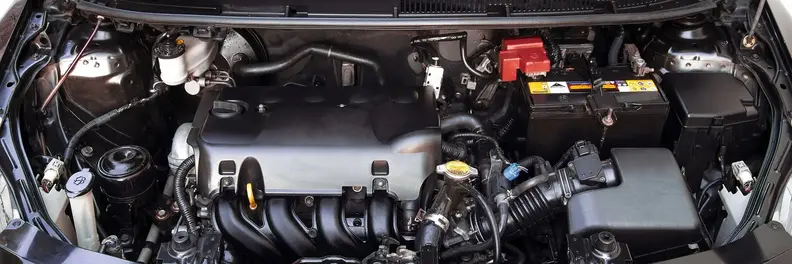

For years, low-ash oils (Low SAPS) have been mainly associated with diesel engines. However, with the popularization of direct fuel injection in gasoline engines, their importance is also growing in spark ignition engines. TotalEnergies experts explain why this is so important – not only for performance, but also for the durability of expensive exhaust system components such as the GPF filter.
Direct fuel injection technology has revolutionized modern motoring. Its main advantage is the ability to reduce fuel consumption while maintaining – and often even improving – performance. Unfortunately, this solution is not without its drawbacks. One of the most serious is soot emissions.
This problem particularly affects modern, downsizing engines. Under high load conditions, areas of excess fuel are created in the combustion chamber. At high temperatures, its molecules break down, forming unburned carbon in the form of soot.
This is why particulate filters (GPFs) have begun to be installed in the exhaust systems of gasoline engines. Interestingly, due to stricter emission standards, GPFs are also being used in indirect injection engines. Although they have less work to do in these units, their presence requires the use of appropriate engine oils. In the case of TotalEnergies, these include products from the Quartz INEO line, which comply with ACEA C standards and contain low-ash additives that extend the life of exhaust gas treatment system components.
GPF raises the bar for oil requirements
Using the wrong oil can accelerate filter clogging. What's more, contaminants that accumulate in the filter as a result of burning the wrong oil make it difficult to burn off. This process must then not only be more frequent, but also takes longer and does not always result in complete cleaning.
As a result, deposits remain in the filter, which over time lead to its permanent clogging. Specifically, this refers to the irreversible clogging of the porous structure of the filter with sulfate ash that cannot be removed. These are formed as a result of the combustion of oil particles that escape from the combustion chambers. This means that the use of unsuitable oils slowly but steadily reduces the filter's flow capacity.
What are the risks of using the wrong oil in engines with GPF filters?
At first, the effects may seem harmless – these include a gradual deterioration in performance and increased fuel consumption. There is also faster oil degradation due to its dilution by fuel. Ultimately, the user is forced to change the oil more often, and the particulate filter – which usually costs at least several thousand zlotys – wears out prematurely.
However, the list of problems does not end there. Difficulties with “burning off” the contents of the filter cause the procedure to be repeated frequently. This results in a continuous increase in the temperature of the exhaust gases, which in turn can strain the valve seats and injectors.
Saving on oil quality therefore brings only short-term financial benefits, and in the long run means much higher expenses.
Not just Low SAPS
Direct injection and downsizing gasoline engines place much higher demands on oils than just low ash content. Dispersion properties (related to soot transport) and knock prevention (LSPI) are also important, but that is a topic for a separate publication. However, it is worth noting at this stage that soot from the combustion chamber in such units also enters the oil, which must absorb it, transport it to the filter, and limit the concentration of contaminants, especially within the chain.
The problem of knocking combustion, on the other hand, results from the appearance of an additional source of ignition, e.g., in the form of incandescent soot particles or carbon deposits in the combustion chamber. The right oil limits the accumulation of these deposits and also partly determines their chemical composition and susceptibility to incandescence.
How to choose the right oil?
For years, TotalEnergies has been promoting the simplest and most effective method of selecting engine oil: following the standard specified by the vehicle manufacturer in the user manual.
For example, a Ford user whose manual specifies the WSS-M2C-952-A1 standard should choose a TotalEnergies oil that meets this standard (it is indicated on the label) – such as Quartz INEO Xtra Dynamics 0W-20 (ACEA C5, API SN-RC). In addition, this oil meets the standards of BMW: LL-17 FE (for 1.5L 3-cylinder TwinPower Turbo engines), Aston Martin (for 5.2 V12 biturbo engines) and Jaguar Land Rover: STJLR.03.5007.

TotalEnergies offers oils suitable for most cars on European roads. Selecting an oil in accordance with the engine or vehicle manufacturer's approval is the simplest and safest method. Regardless of the method, however, it is worth remembering that modern gasoline engines with GPF filters also require low-ash oils (Low SAPS).